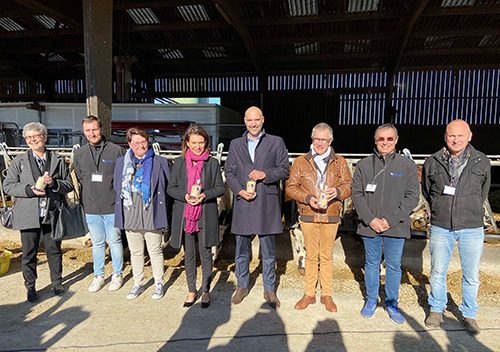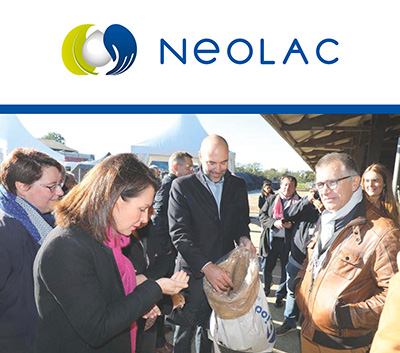NEOLAC: a research project to improve the environment, animal welfare and the competitiveness of the French dairy industry
NEOLAC is the result of a consortium between Biodevas Laboratoires, a specialist in the formulation and manufacture of 100% natural phytogenic solutions (plant extracts) for agriculture, INRAE, the French National Research Institute for Agriculture, Food and the Environment, and SODIAAL, France’s leading dairy cooperative, with support from the BPI and the Pays de la Loire, Brittany and Rennes Métropole regions.

Tackling the 3 main pathologies affecting dairy cows
This is an ambitious research and development programme designed to reduce the economic, health and environmental impact of the main diseases affecting dairy cows: mastitis during lactation, mastitis during drying off and management of the peripartum period. These are the diseases that consume the most chemical inputs and for which there are not enough scientifically validated alternatives.
Launched in January 2021 for a period of 4 years, the project was inaugurated on 28 October at the launch of its first full-scale experimental phase on 100 dairy farms mobilised by SODIAAL.
The first trial of the solution, which aims to improve the immune status of dairy cows and limit the occurrence of mastitis during lactation, began on an INRAE experimental farm near Rennes in early September 2021. It will enable the research centre to develop new study methodologies and models. A PhD student has been recruited by Biodevas Laboratoires to monitor this work as part of a Cifre thesis being carried out at INRAE.
This trial is being supplemented by a large-scale field deployment over 12 months, involving 100 volunteer farms, mobilised by the SODIAAL cooperative.
A 30-50% reduction in chemical inputs
NEOLAC aims to reduce the use of chemical inputs against these 3 diseases by 30-50%, thanks to effective solutions that can be applied to all breeding systems, regardless of location, breed, production volume or milking techniques.
It will put into practice the recommendations of the EcoAntiobio plan and the Anses on the use of plants as alternatives to antibiotics.
Financial benefits for dairy farms
The use of such natural, preventive solutions should enable farmers to make financial gains, whatever the type of farm (organic, traditional, intensive), by :
- Reduced rearing costs, as the natural solutions developed are less expensive than the usual antibiotic treatment;
- Improved milk quality, leading to better value for money.
All in all, substantial savings are expected for each farm.
The competitiveness and sustainability of the French dairy industry as a whole (from the farmer through to the processing of milk into by-products) will be strengthened with specific, 100% French know-how that respects the environment, is in line with new consumer expectations, and will secure farmers’ incomes through new elements of market differentiation.
Approved by the Valorial competitiveness cluster, dedicated to agri-food innovation, the large-scale experimentation of the NEOLAC project was inaugurated on 28 October, in the presence of Christelle Morançais, President of the Pays de la Loire Region. The event took place at the Baratte farm in Mayenne, a model of modernity in terms of both its production methods and its commitment to social responsibility.

